Exploring Principles of Care: Impact on Rights of Vulnerable People
VerifiedAdded on 2023/06/05
|11
|3978
|334
Report
AI Summary
This report explores the critical importance of principles of care in health and social care, particularly in empowering vulnerable adults and safeguarding their rights. It examines how these principles, influenced by legislation, policies, and codes of conduct, ensure that the needs of service users are met. The report highlights the significance of a person-centered approach, emphasizing the need for skilled and knowledgeable caregivers who can provide quality care and support decision-making for patients. It also discusses the five key factors of care: dignity, communication, safety, privacy, and independence, and how these contribute to the well-being of vulnerable individuals. Furthermore, the report addresses challenges in healthcare, such as quality crises, medical errors, and lack of access to care, while underscoring the importance of legislation like the Care Act 2014, Safeguarding Act 2006, and Mental Capacity Act 2005 in protecting vulnerable individuals. The report concludes by emphasizing the need for continuous improvement in healthcare practices and policies to ensure the safety and well-being of all patients.
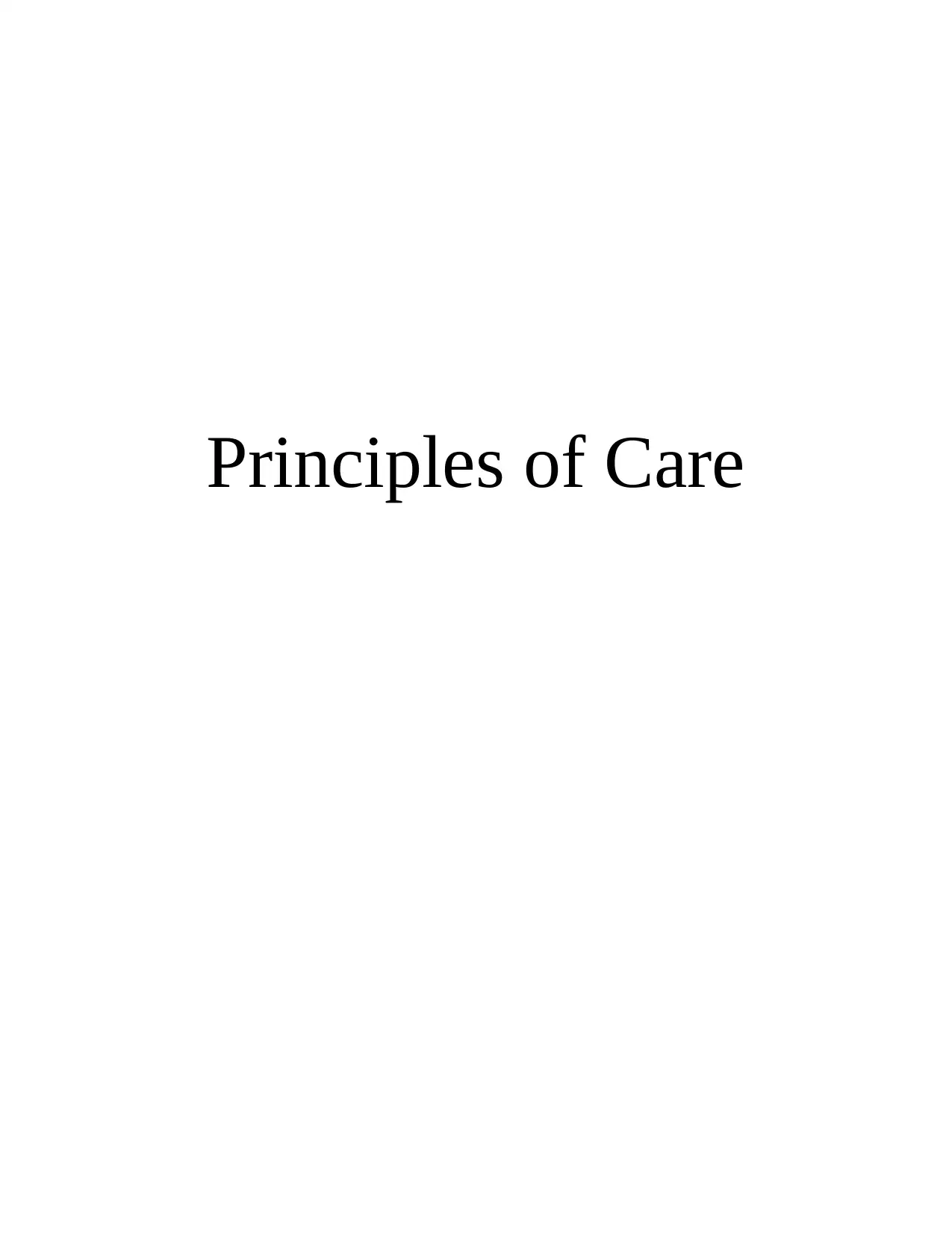
Principles of Care
Paraphrase This Document
Need a fresh take? Get an instant paraphrase of this document with our AI Paraphraser
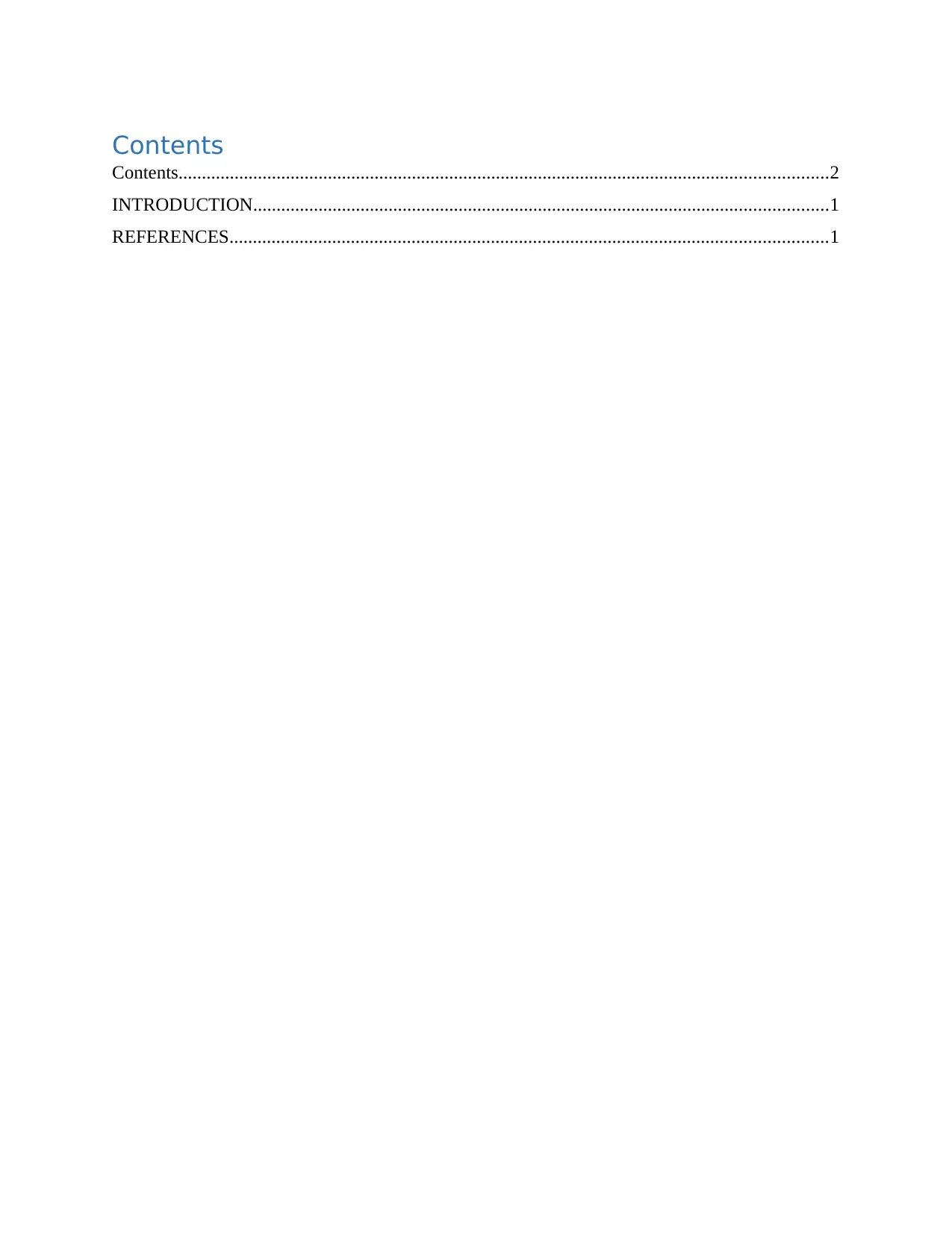
Contents
Contents...........................................................................................................................................2
INTRODUCTION...........................................................................................................................1
REFERENCES................................................................................................................................1
Contents...........................................................................................................................................2
INTRODUCTION...........................................................................................................................1
REFERENCES................................................................................................................................1
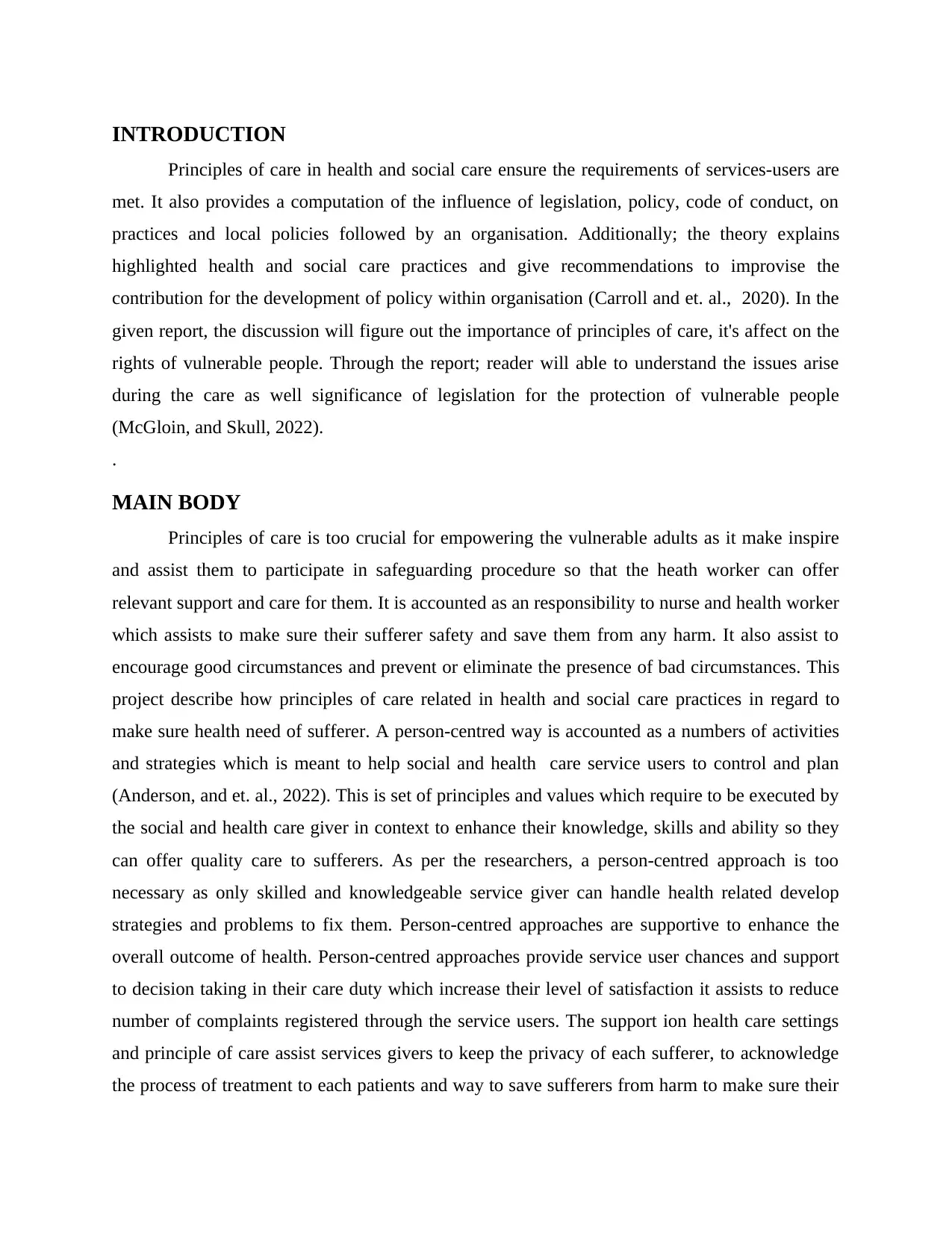
INTRODUCTION
Principles of care in health and social care ensure the requirements of services-users are
met. It also provides a computation of the influence of legislation, policy, code of conduct, on
practices and local policies followed by an organisation. Additionally; the theory explains
highlighted health and social care practices and give recommendations to improvise the
contribution for the development of policy within organisation (Carroll and et. al., 2020). In the
given report, the discussion will figure out the importance of principles of care, it's affect on the
rights of vulnerable people. Through the report; reader will able to understand the issues arise
during the care as well significance of legislation for the protection of vulnerable people
(McGloin, and Skull, 2022).
.
MAIN BODY
Principles of care is too crucial for empowering the vulnerable adults as it make inspire
and assist them to participate in safeguarding procedure so that the heath worker can offer
relevant support and care for them. It is accounted as an responsibility to nurse and health worker
which assists to make sure their sufferer safety and save them from any harm. It also assist to
encourage good circumstances and prevent or eliminate the presence of bad circumstances. This
project describe how principles of care related in health and social care practices in regard to
make sure health need of sufferer. A person-centred way is accounted as a numbers of activities
and strategies which is meant to help social and health care service users to control and plan
(Anderson, and et. al., 2022). This is set of principles and values which require to be executed by
the social and health care giver in context to enhance their knowledge, skills and ability so they
can offer quality care to sufferers. As per the researchers, a person-centred approach is too
necessary as only skilled and knowledgeable service giver can handle health related develop
strategies and problems to fix them. Person-centred approaches are supportive to enhance the
overall outcome of health. Person-centred approaches provide service user chances and support
to decision taking in their care duty which increase their level of satisfaction it assists to reduce
number of complaints registered through the service users. The support ion health care settings
and principle of care assist services givers to keep the privacy of each sufferer, to acknowledge
the process of treatment to each patients and way to save sufferers from harm to make sure their
Principles of care in health and social care ensure the requirements of services-users are
met. It also provides a computation of the influence of legislation, policy, code of conduct, on
practices and local policies followed by an organisation. Additionally; the theory explains
highlighted health and social care practices and give recommendations to improvise the
contribution for the development of policy within organisation (Carroll and et. al., 2020). In the
given report, the discussion will figure out the importance of principles of care, it's affect on the
rights of vulnerable people. Through the report; reader will able to understand the issues arise
during the care as well significance of legislation for the protection of vulnerable people
(McGloin, and Skull, 2022).
.
MAIN BODY
Principles of care is too crucial for empowering the vulnerable adults as it make inspire
and assist them to participate in safeguarding procedure so that the heath worker can offer
relevant support and care for them. It is accounted as an responsibility to nurse and health worker
which assists to make sure their sufferer safety and save them from any harm. It also assist to
encourage good circumstances and prevent or eliminate the presence of bad circumstances. This
project describe how principles of care related in health and social care practices in regard to
make sure health need of sufferer. A person-centred way is accounted as a numbers of activities
and strategies which is meant to help social and health care service users to control and plan
(Anderson, and et. al., 2022). This is set of principles and values which require to be executed by
the social and health care giver in context to enhance their knowledge, skills and ability so they
can offer quality care to sufferers. As per the researchers, a person-centred approach is too
necessary as only skilled and knowledgeable service giver can handle health related develop
strategies and problems to fix them. Person-centred approaches are supportive to enhance the
overall outcome of health. Person-centred approaches provide service user chances and support
to decision taking in their care duty which increase their level of satisfaction it assists to reduce
number of complaints registered through the service users. The support ion health care settings
and principle of care assist services givers to keep the privacy of each sufferer, to acknowledge
the process of treatment to each patients and way to save sufferers from harm to make sure their
⊘ This is a preview!⊘
Do you want full access?
Subscribe today to unlock all pages.

Trusted by 1+ million students worldwide
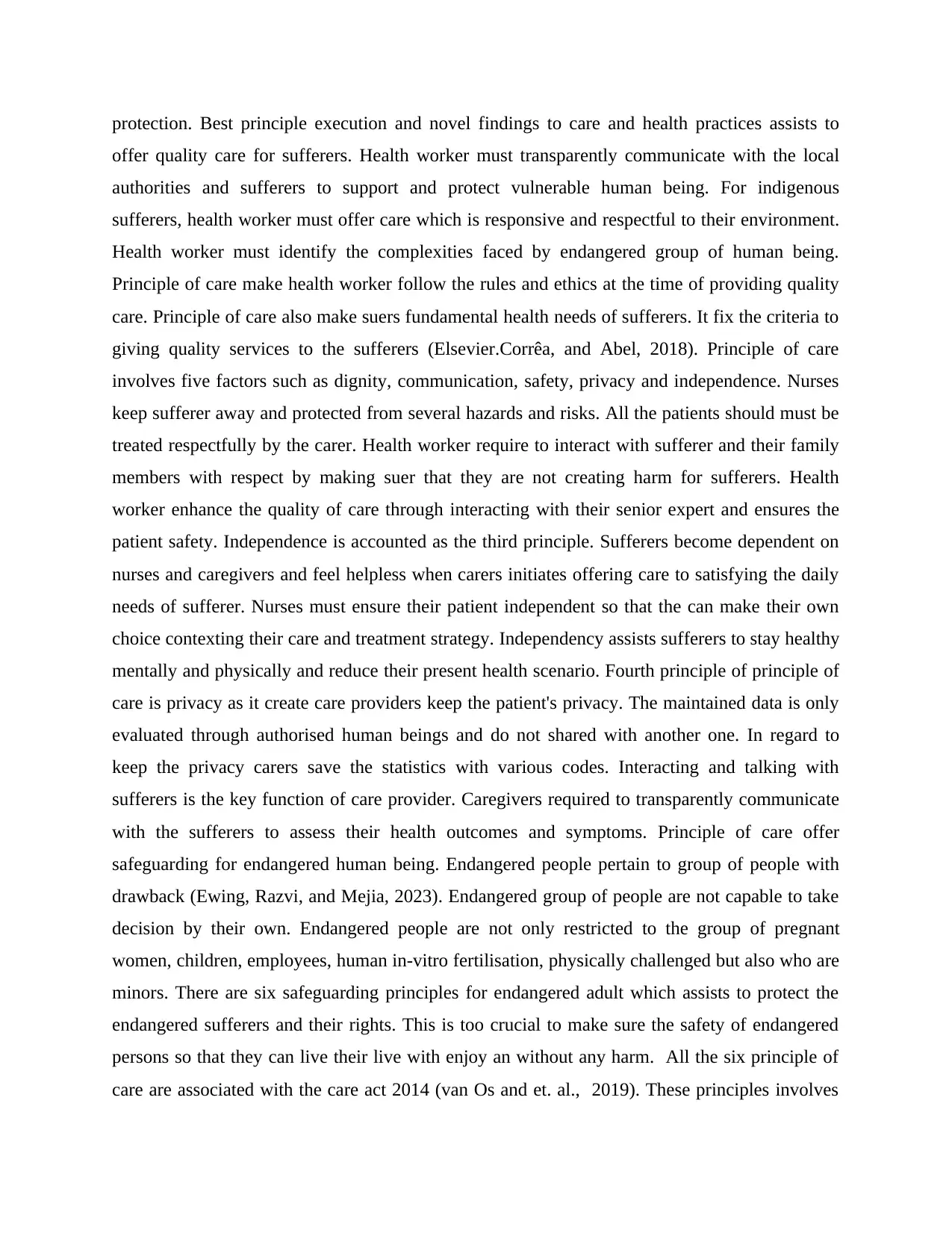
protection. Best principle execution and novel findings to care and health practices assists to
offer quality care for sufferers. Health worker must transparently communicate with the local
authorities and sufferers to support and protect vulnerable human being. For indigenous
sufferers, health worker must offer care which is responsive and respectful to their environment.
Health worker must identify the complexities faced by endangered group of human being.
Principle of care make health worker follow the rules and ethics at the time of providing quality
care. Principle of care also make suers fundamental health needs of sufferers. It fix the criteria to
giving quality services to the sufferers (Elsevier.Corrêa, and Abel, 2018). Principle of care
involves five factors such as dignity, communication, safety, privacy and independence. Nurses
keep sufferer away and protected from several hazards and risks. All the patients should must be
treated respectfully by the carer. Health worker require to interact with sufferer and their family
members with respect by making suer that they are not creating harm for sufferers. Health
worker enhance the quality of care through interacting with their senior expert and ensures the
patient safety. Independence is accounted as the third principle. Sufferers become dependent on
nurses and caregivers and feel helpless when carers initiates offering care to satisfying the daily
needs of sufferer. Nurses must ensure their patient independent so that the can make their own
choice contexting their care and treatment strategy. Independency assists sufferers to stay healthy
mentally and physically and reduce their present health scenario. Fourth principle of principle of
care is privacy as it create care providers keep the patient's privacy. The maintained data is only
evaluated through authorised human beings and do not shared with another one. In regard to
keep the privacy carers save the statistics with various codes. Interacting and talking with
sufferers is the key function of care provider. Caregivers required to transparently communicate
with the sufferers to assess their health outcomes and symptoms. Principle of care offer
safeguarding for endangered human being. Endangered people pertain to group of people with
drawback (Ewing, Razvi, and Mejia, 2023). Endangered group of people are not capable to take
decision by their own. Endangered people are not only restricted to the group of pregnant
women, children, employees, human in-vitro fertilisation, physically challenged but also who are
minors. There are six safeguarding principles for endangered adult which assists to protect the
endangered sufferers and their rights. This is too crucial to make sure the safety of endangered
persons so that they can live their live with enjoy an without any harm. All the six principle of
care are associated with the care act 2014 (van Os and et. al., 2019). These principles involves
offer quality care for sufferers. Health worker must transparently communicate with the local
authorities and sufferers to support and protect vulnerable human being. For indigenous
sufferers, health worker must offer care which is responsive and respectful to their environment.
Health worker must identify the complexities faced by endangered group of human being.
Principle of care make health worker follow the rules and ethics at the time of providing quality
care. Principle of care also make suers fundamental health needs of sufferers. It fix the criteria to
giving quality services to the sufferers (Elsevier.Corrêa, and Abel, 2018). Principle of care
involves five factors such as dignity, communication, safety, privacy and independence. Nurses
keep sufferer away and protected from several hazards and risks. All the patients should must be
treated respectfully by the carer. Health worker require to interact with sufferer and their family
members with respect by making suer that they are not creating harm for sufferers. Health
worker enhance the quality of care through interacting with their senior expert and ensures the
patient safety. Independence is accounted as the third principle. Sufferers become dependent on
nurses and caregivers and feel helpless when carers initiates offering care to satisfying the daily
needs of sufferer. Nurses must ensure their patient independent so that the can make their own
choice contexting their care and treatment strategy. Independency assists sufferers to stay healthy
mentally and physically and reduce their present health scenario. Fourth principle of principle of
care is privacy as it create care providers keep the patient's privacy. The maintained data is only
evaluated through authorised human beings and do not shared with another one. In regard to
keep the privacy carers save the statistics with various codes. Interacting and talking with
sufferers is the key function of care provider. Caregivers required to transparently communicate
with the sufferers to assess their health outcomes and symptoms. Principle of care offer
safeguarding for endangered human being. Endangered people pertain to group of people with
drawback (Ewing, Razvi, and Mejia, 2023). Endangered group of people are not capable to take
decision by their own. Endangered people are not only restricted to the group of pregnant
women, children, employees, human in-vitro fertilisation, physically challenged but also who are
minors. There are six safeguarding principles for endangered adult which assists to protect the
endangered sufferers and their rights. This is too crucial to make sure the safety of endangered
persons so that they can live their live with enjoy an without any harm. All the six principle of
care are associated with the care act 2014 (van Os and et. al., 2019). These principles involves
Paraphrase This Document
Need a fresh take? Get an instant paraphrase of this document with our AI Paraphraser
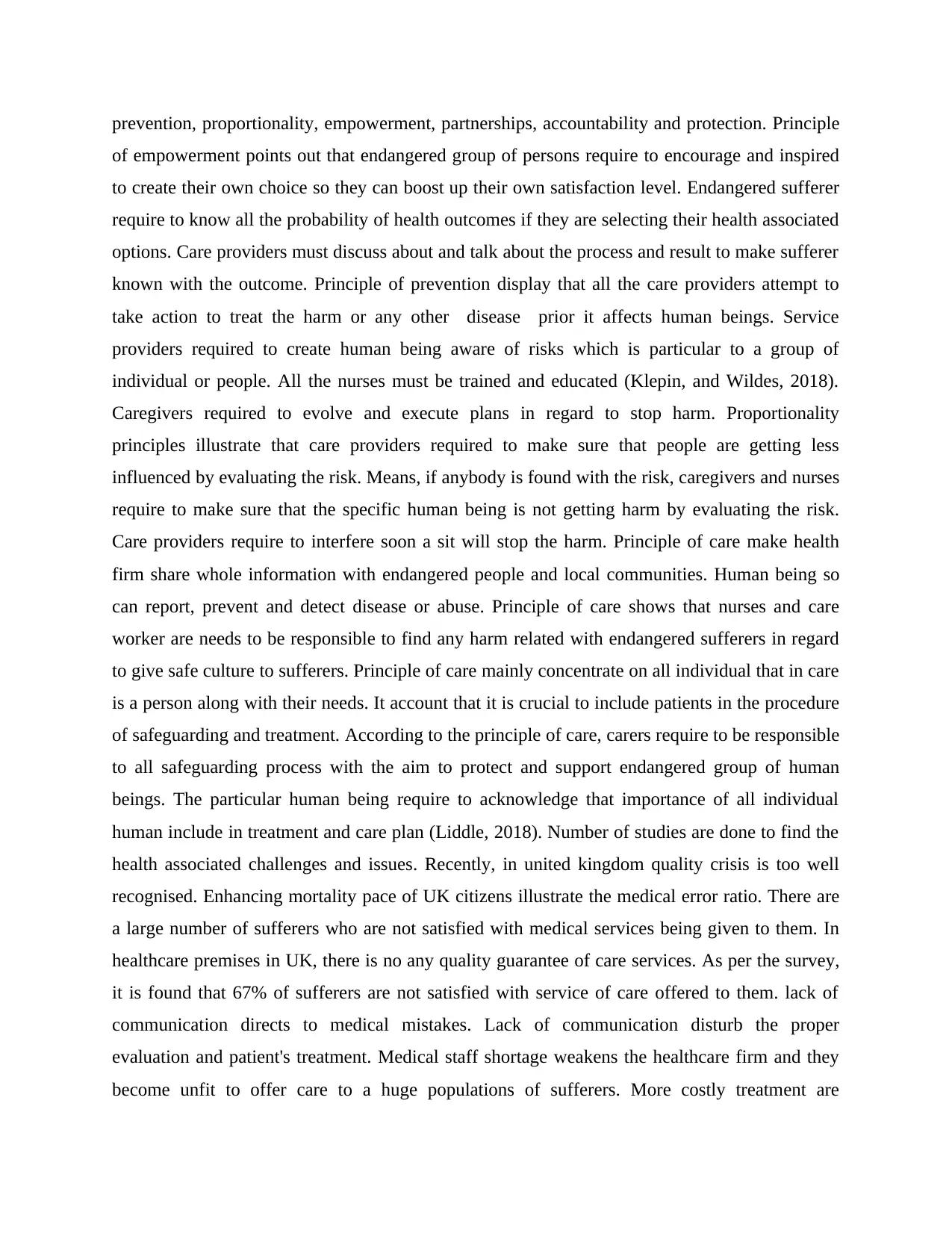
prevention, proportionality, empowerment, partnerships, accountability and protection. Principle
of empowerment points out that endangered group of persons require to encourage and inspired
to create their own choice so they can boost up their own satisfaction level. Endangered sufferer
require to know all the probability of health outcomes if they are selecting their health associated
options. Care providers must discuss about and talk about the process and result to make sufferer
known with the outcome. Principle of prevention display that all the care providers attempt to
take action to treat the harm or any other disease prior it affects human beings. Service
providers required to create human being aware of risks which is particular to a group of
individual or people. All the nurses must be trained and educated (Klepin, and Wildes, 2018).
Caregivers required to evolve and execute plans in regard to stop harm. Proportionality
principles illustrate that care providers required to make sure that people are getting less
influenced by evaluating the risk. Means, if anybody is found with the risk, caregivers and nurses
require to make sure that the specific human being is not getting harm by evaluating the risk.
Care providers require to interfere soon a sit will stop the harm. Principle of care make health
firm share whole information with endangered people and local communities. Human being so
can report, prevent and detect disease or abuse. Principle of care shows that nurses and care
worker are needs to be responsible to find any harm related with endangered sufferers in regard
to give safe culture to sufferers. Principle of care mainly concentrate on all individual that in care
is a person along with their needs. It account that it is crucial to include patients in the procedure
of safeguarding and treatment. According to the principle of care, carers require to be responsible
to all safeguarding process with the aim to protect and support endangered group of human
beings. The particular human being require to acknowledge that importance of all individual
human include in treatment and care plan (Liddle, 2018). Number of studies are done to find the
health associated challenges and issues. Recently, in united kingdom quality crisis is too well
recognised. Enhancing mortality pace of UK citizens illustrate the medical error ratio. There are
a large number of sufferers who are not satisfied with medical services being given to them. In
healthcare premises in UK, there is no any quality guarantee of care services. As per the survey,
it is found that 67% of sufferers are not satisfied with service of care offered to them. lack of
communication directs to medical mistakes. Lack of communication disturb the proper
evaluation and patient's treatment. Medical staff shortage weakens the healthcare firm and they
become unfit to offer care to a huge populations of sufferers. More costly treatment are
of empowerment points out that endangered group of persons require to encourage and inspired
to create their own choice so they can boost up their own satisfaction level. Endangered sufferer
require to know all the probability of health outcomes if they are selecting their health associated
options. Care providers must discuss about and talk about the process and result to make sufferer
known with the outcome. Principle of prevention display that all the care providers attempt to
take action to treat the harm or any other disease prior it affects human beings. Service
providers required to create human being aware of risks which is particular to a group of
individual or people. All the nurses must be trained and educated (Klepin, and Wildes, 2018).
Caregivers required to evolve and execute plans in regard to stop harm. Proportionality
principles illustrate that care providers required to make sure that people are getting less
influenced by evaluating the risk. Means, if anybody is found with the risk, caregivers and nurses
require to make sure that the specific human being is not getting harm by evaluating the risk.
Care providers require to interfere soon a sit will stop the harm. Principle of care make health
firm share whole information with endangered people and local communities. Human being so
can report, prevent and detect disease or abuse. Principle of care shows that nurses and care
worker are needs to be responsible to find any harm related with endangered sufferers in regard
to give safe culture to sufferers. Principle of care mainly concentrate on all individual that in care
is a person along with their needs. It account that it is crucial to include patients in the procedure
of safeguarding and treatment. According to the principle of care, carers require to be responsible
to all safeguarding process with the aim to protect and support endangered group of human
beings. The particular human being require to acknowledge that importance of all individual
human include in treatment and care plan (Liddle, 2018). Number of studies are done to find the
health associated challenges and issues. Recently, in united kingdom quality crisis is too well
recognised. Enhancing mortality pace of UK citizens illustrate the medical error ratio. There are
a large number of sufferers who are not satisfied with medical services being given to them. In
healthcare premises in UK, there is no any quality guarantee of care services. As per the survey,
it is found that 67% of sufferers are not satisfied with service of care offered to them. lack of
communication directs to medical mistakes. Lack of communication disturb the proper
evaluation and patient's treatment. Medical staff shortage weakens the healthcare firm and they
become unfit to offer care to a huge populations of sufferers. More costly treatment are
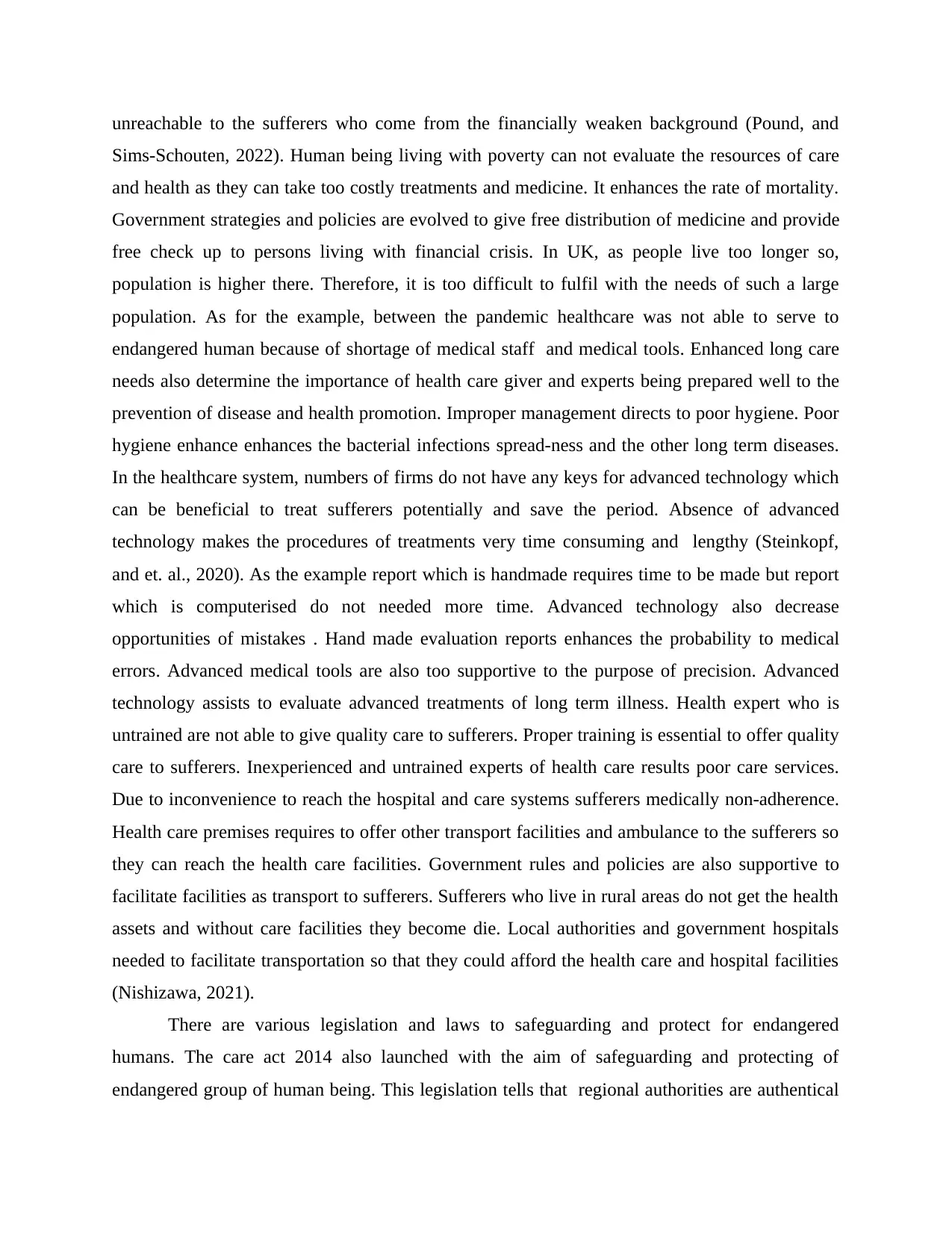
unreachable to the sufferers who come from the financially weaken background (Pound, and
Sims-Schouten, 2022). Human being living with poverty can not evaluate the resources of care
and health as they can take too costly treatments and medicine. It enhances the rate of mortality.
Government strategies and policies are evolved to give free distribution of medicine and provide
free check up to persons living with financial crisis. In UK, as people live too longer so,
population is higher there. Therefore, it is too difficult to fulfil with the needs of such a large
population. As for the example, between the pandemic healthcare was not able to serve to
endangered human because of shortage of medical staff and medical tools. Enhanced long care
needs also determine the importance of health care giver and experts being prepared well to the
prevention of disease and health promotion. Improper management directs to poor hygiene. Poor
hygiene enhance enhances the bacterial infections spread-ness and the other long term diseases.
In the healthcare system, numbers of firms do not have any keys for advanced technology which
can be beneficial to treat sufferers potentially and save the period. Absence of advanced
technology makes the procedures of treatments very time consuming and lengthy (Steinkopf,
and et. al., 2020). As the example report which is handmade requires time to be made but report
which is computerised do not needed more time. Advanced technology also decrease
opportunities of mistakes . Hand made evaluation reports enhances the probability to medical
errors. Advanced medical tools are also too supportive to the purpose of precision. Advanced
technology assists to evaluate advanced treatments of long term illness. Health expert who is
untrained are not able to give quality care to sufferers. Proper training is essential to offer quality
care to sufferers. Inexperienced and untrained experts of health care results poor care services.
Due to inconvenience to reach the hospital and care systems sufferers medically non-adherence.
Health care premises requires to offer other transport facilities and ambulance to the sufferers so
they can reach the health care facilities. Government rules and policies are also supportive to
facilitate facilities as transport to sufferers. Sufferers who live in rural areas do not get the health
assets and without care facilities they become die. Local authorities and government hospitals
needed to facilitate transportation so that they could afford the health care and hospital facilities
(Nishizawa, 2021).
There are various legislation and laws to safeguarding and protect for endangered
humans. The care act 2014 also launched with the aim of safeguarding and protecting of
endangered group of human being. This legislation tells that regional authorities are authentical
Sims-Schouten, 2022). Human being living with poverty can not evaluate the resources of care
and health as they can take too costly treatments and medicine. It enhances the rate of mortality.
Government strategies and policies are evolved to give free distribution of medicine and provide
free check up to persons living with financial crisis. In UK, as people live too longer so,
population is higher there. Therefore, it is too difficult to fulfil with the needs of such a large
population. As for the example, between the pandemic healthcare was not able to serve to
endangered human because of shortage of medical staff and medical tools. Enhanced long care
needs also determine the importance of health care giver and experts being prepared well to the
prevention of disease and health promotion. Improper management directs to poor hygiene. Poor
hygiene enhance enhances the bacterial infections spread-ness and the other long term diseases.
In the healthcare system, numbers of firms do not have any keys for advanced technology which
can be beneficial to treat sufferers potentially and save the period. Absence of advanced
technology makes the procedures of treatments very time consuming and lengthy (Steinkopf,
and et. al., 2020). As the example report which is handmade requires time to be made but report
which is computerised do not needed more time. Advanced technology also decrease
opportunities of mistakes . Hand made evaluation reports enhances the probability to medical
errors. Advanced medical tools are also too supportive to the purpose of precision. Advanced
technology assists to evaluate advanced treatments of long term illness. Health expert who is
untrained are not able to give quality care to sufferers. Proper training is essential to offer quality
care to sufferers. Inexperienced and untrained experts of health care results poor care services.
Due to inconvenience to reach the hospital and care systems sufferers medically non-adherence.
Health care premises requires to offer other transport facilities and ambulance to the sufferers so
they can reach the health care facilities. Government rules and policies are also supportive to
facilitate facilities as transport to sufferers. Sufferers who live in rural areas do not get the health
assets and without care facilities they become die. Local authorities and government hospitals
needed to facilitate transportation so that they could afford the health care and hospital facilities
(Nishizawa, 2021).
There are various legislation and laws to safeguarding and protect for endangered
humans. The care act 2014 also launched with the aim of safeguarding and protecting of
endangered group of human being. This legislation tells that regional authorities are authentical
⊘ This is a preview!⊘
Do you want full access?
Subscribe today to unlock all pages.

Trusted by 1+ million students worldwide
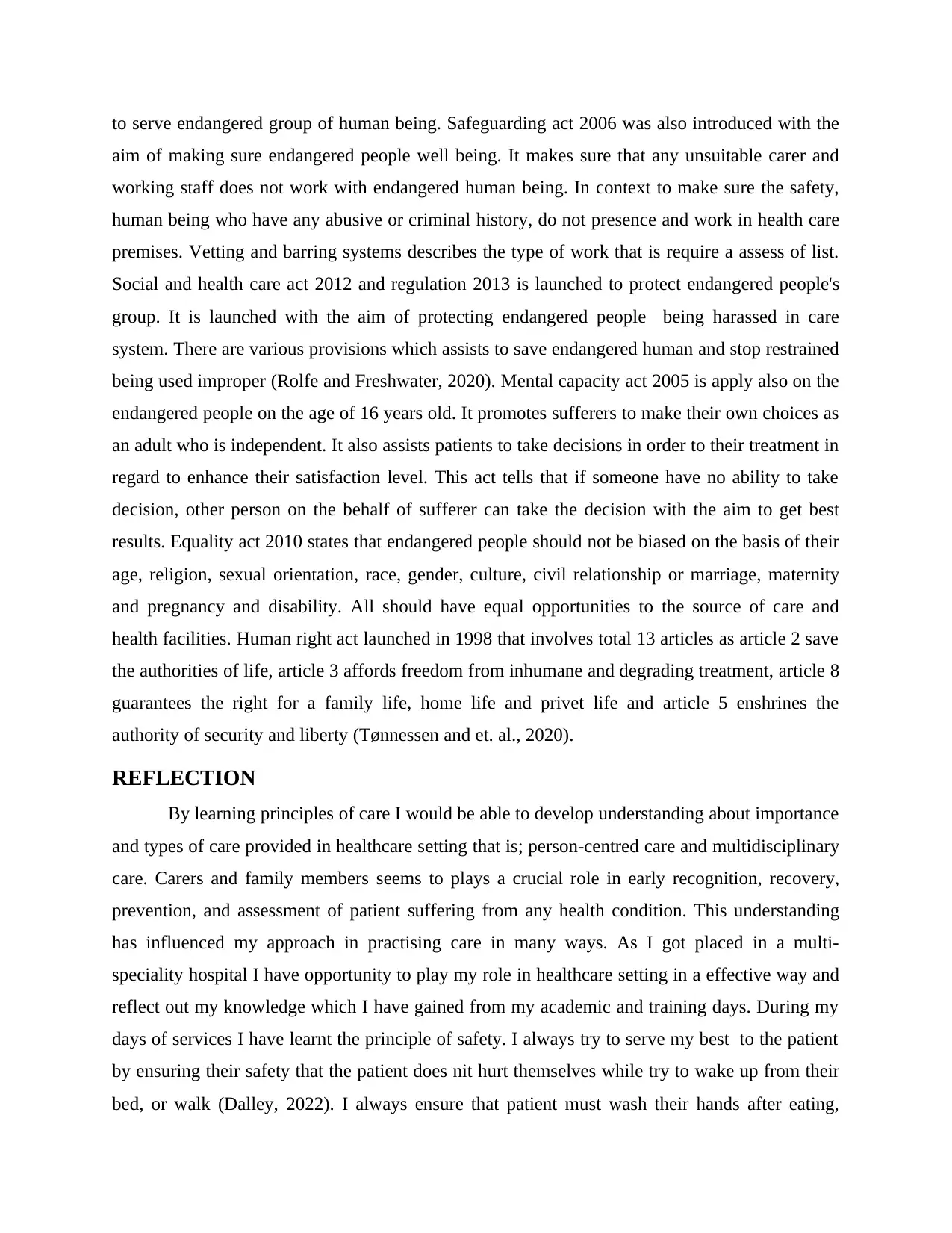
to serve endangered group of human being. Safeguarding act 2006 was also introduced with the
aim of making sure endangered people well being. It makes sure that any unsuitable carer and
working staff does not work with endangered human being. In context to make sure the safety,
human being who have any abusive or criminal history, do not presence and work in health care
premises. Vetting and barring systems describes the type of work that is require a assess of list.
Social and health care act 2012 and regulation 2013 is launched to protect endangered people's
group. It is launched with the aim of protecting endangered people being harassed in care
system. There are various provisions which assists to save endangered human and stop restrained
being used improper (Rolfe and Freshwater, 2020). Mental capacity act 2005 is apply also on the
endangered people on the age of 16 years old. It promotes sufferers to make their own choices as
an adult who is independent. It also assists patients to take decisions in order to their treatment in
regard to enhance their satisfaction level. This act tells that if someone have no ability to take
decision, other person on the behalf of sufferer can take the decision with the aim to get best
results. Equality act 2010 states that endangered people should not be biased on the basis of their
age, religion, sexual orientation, race, gender, culture, civil relationship or marriage, maternity
and pregnancy and disability. All should have equal opportunities to the source of care and
health facilities. Human right act launched in 1998 that involves total 13 articles as article 2 save
the authorities of life, article 3 affords freedom from inhumane and degrading treatment, article 8
guarantees the right for a family life, home life and privet life and article 5 enshrines the
authority of security and liberty (Tønnessen and et. al., 2020).
REFLECTION
By learning principles of care I would be able to develop understanding about importance
and types of care provided in healthcare setting that is; person-centred care and multidisciplinary
care. Carers and family members seems to plays a crucial role in early recognition, recovery,
prevention, and assessment of patient suffering from any health condition. This understanding
has influenced my approach in practising care in many ways. As I got placed in a multi-
speciality hospital I have opportunity to play my role in healthcare setting in a effective way and
reflect out my knowledge which I have gained from my academic and training days. During my
days of services I have learnt the principle of safety. I always try to serve my best to the patient
by ensuring their safety that the patient does nit hurt themselves while try to wake up from their
bed, or walk (Dalley, 2022). I always ensure that patient must wash their hands after eating,
aim of making sure endangered people well being. It makes sure that any unsuitable carer and
working staff does not work with endangered human being. In context to make sure the safety,
human being who have any abusive or criminal history, do not presence and work in health care
premises. Vetting and barring systems describes the type of work that is require a assess of list.
Social and health care act 2012 and regulation 2013 is launched to protect endangered people's
group. It is launched with the aim of protecting endangered people being harassed in care
system. There are various provisions which assists to save endangered human and stop restrained
being used improper (Rolfe and Freshwater, 2020). Mental capacity act 2005 is apply also on the
endangered people on the age of 16 years old. It promotes sufferers to make their own choices as
an adult who is independent. It also assists patients to take decisions in order to their treatment in
regard to enhance their satisfaction level. This act tells that if someone have no ability to take
decision, other person on the behalf of sufferer can take the decision with the aim to get best
results. Equality act 2010 states that endangered people should not be biased on the basis of their
age, religion, sexual orientation, race, gender, culture, civil relationship or marriage, maternity
and pregnancy and disability. All should have equal opportunities to the source of care and
health facilities. Human right act launched in 1998 that involves total 13 articles as article 2 save
the authorities of life, article 3 affords freedom from inhumane and degrading treatment, article 8
guarantees the right for a family life, home life and privet life and article 5 enshrines the
authority of security and liberty (Tønnessen and et. al., 2020).
REFLECTION
By learning principles of care I would be able to develop understanding about importance
and types of care provided in healthcare setting that is; person-centred care and multidisciplinary
care. Carers and family members seems to plays a crucial role in early recognition, recovery,
prevention, and assessment of patient suffering from any health condition. This understanding
has influenced my approach in practising care in many ways. As I got placed in a multi-
speciality hospital I have opportunity to play my role in healthcare setting in a effective way and
reflect out my knowledge which I have gained from my academic and training days. During my
days of services I have learnt the principle of safety. I always try to serve my best to the patient
by ensuring their safety that the patient does nit hurt themselves while try to wake up from their
bed, or walk (Dalley, 2022). I always ensure that patient must wash their hands after eating,
Paraphrase This Document
Need a fresh take? Get an instant paraphrase of this document with our AI Paraphraser
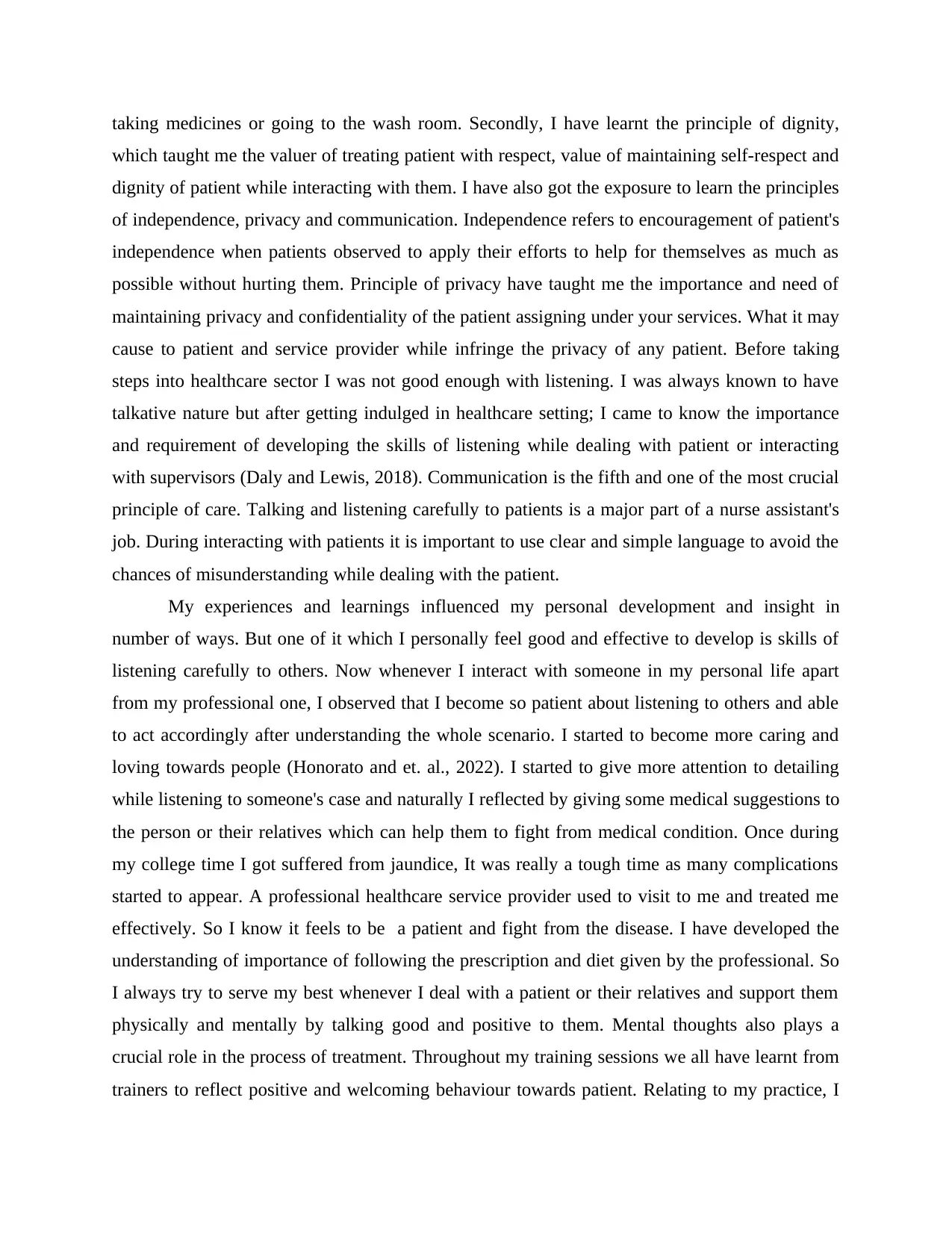
taking medicines or going to the wash room. Secondly, I have learnt the principle of dignity,
which taught me the valuer of treating patient with respect, value of maintaining self-respect and
dignity of patient while interacting with them. I have also got the exposure to learn the principles
of independence, privacy and communication. Independence refers to encouragement of patient's
independence when patients observed to apply their efforts to help for themselves as much as
possible without hurting them. Principle of privacy have taught me the importance and need of
maintaining privacy and confidentiality of the patient assigning under your services. What it may
cause to patient and service provider while infringe the privacy of any patient. Before taking
steps into healthcare sector I was not good enough with listening. I was always known to have
talkative nature but after getting indulged in healthcare setting; I came to know the importance
and requirement of developing the skills of listening while dealing with patient or interacting
with supervisors (Daly and Lewis, 2018). Communication is the fifth and one of the most crucial
principle of care. Talking and listening carefully to patients is a major part of a nurse assistant's
job. During interacting with patients it is important to use clear and simple language to avoid the
chances of misunderstanding while dealing with the patient.
My experiences and learnings influenced my personal development and insight in
number of ways. But one of it which I personally feel good and effective to develop is skills of
listening carefully to others. Now whenever I interact with someone in my personal life apart
from my professional one, I observed that I become so patient about listening to others and able
to act accordingly after understanding the whole scenario. I started to become more caring and
loving towards people (Honorato and et. al., 2022). I started to give more attention to detailing
while listening to someone's case and naturally I reflected by giving some medical suggestions to
the person or their relatives which can help them to fight from medical condition. Once during
my college time I got suffered from jaundice, It was really a tough time as many complications
started to appear. A professional healthcare service provider used to visit to me and treated me
effectively. So I know it feels to be a patient and fight from the disease. I have developed the
understanding of importance of following the prescription and diet given by the professional. So
I always try to serve my best whenever I deal with a patient or their relatives and support them
physically and mentally by talking good and positive to them. Mental thoughts also plays a
crucial role in the process of treatment. Throughout my training sessions we all have learnt from
trainers to reflect positive and welcoming behaviour towards patient. Relating to my practice, I
which taught me the valuer of treating patient with respect, value of maintaining self-respect and
dignity of patient while interacting with them. I have also got the exposure to learn the principles
of independence, privacy and communication. Independence refers to encouragement of patient's
independence when patients observed to apply their efforts to help for themselves as much as
possible without hurting them. Principle of privacy have taught me the importance and need of
maintaining privacy and confidentiality of the patient assigning under your services. What it may
cause to patient and service provider while infringe the privacy of any patient. Before taking
steps into healthcare sector I was not good enough with listening. I was always known to have
talkative nature but after getting indulged in healthcare setting; I came to know the importance
and requirement of developing the skills of listening while dealing with patient or interacting
with supervisors (Daly and Lewis, 2018). Communication is the fifth and one of the most crucial
principle of care. Talking and listening carefully to patients is a major part of a nurse assistant's
job. During interacting with patients it is important to use clear and simple language to avoid the
chances of misunderstanding while dealing with the patient.
My experiences and learnings influenced my personal development and insight in
number of ways. But one of it which I personally feel good and effective to develop is skills of
listening carefully to others. Now whenever I interact with someone in my personal life apart
from my professional one, I observed that I become so patient about listening to others and able
to act accordingly after understanding the whole scenario. I started to become more caring and
loving towards people (Honorato and et. al., 2022). I started to give more attention to detailing
while listening to someone's case and naturally I reflected by giving some medical suggestions to
the person or their relatives which can help them to fight from medical condition. Once during
my college time I got suffered from jaundice, It was really a tough time as many complications
started to appear. A professional healthcare service provider used to visit to me and treated me
effectively. So I know it feels to be a patient and fight from the disease. I have developed the
understanding of importance of following the prescription and diet given by the professional. So
I always try to serve my best whenever I deal with a patient or their relatives and support them
physically and mentally by talking good and positive to them. Mental thoughts also plays a
crucial role in the process of treatment. Throughout my training sessions we all have learnt from
trainers to reflect positive and welcoming behaviour towards patient. Relating to my practice, I
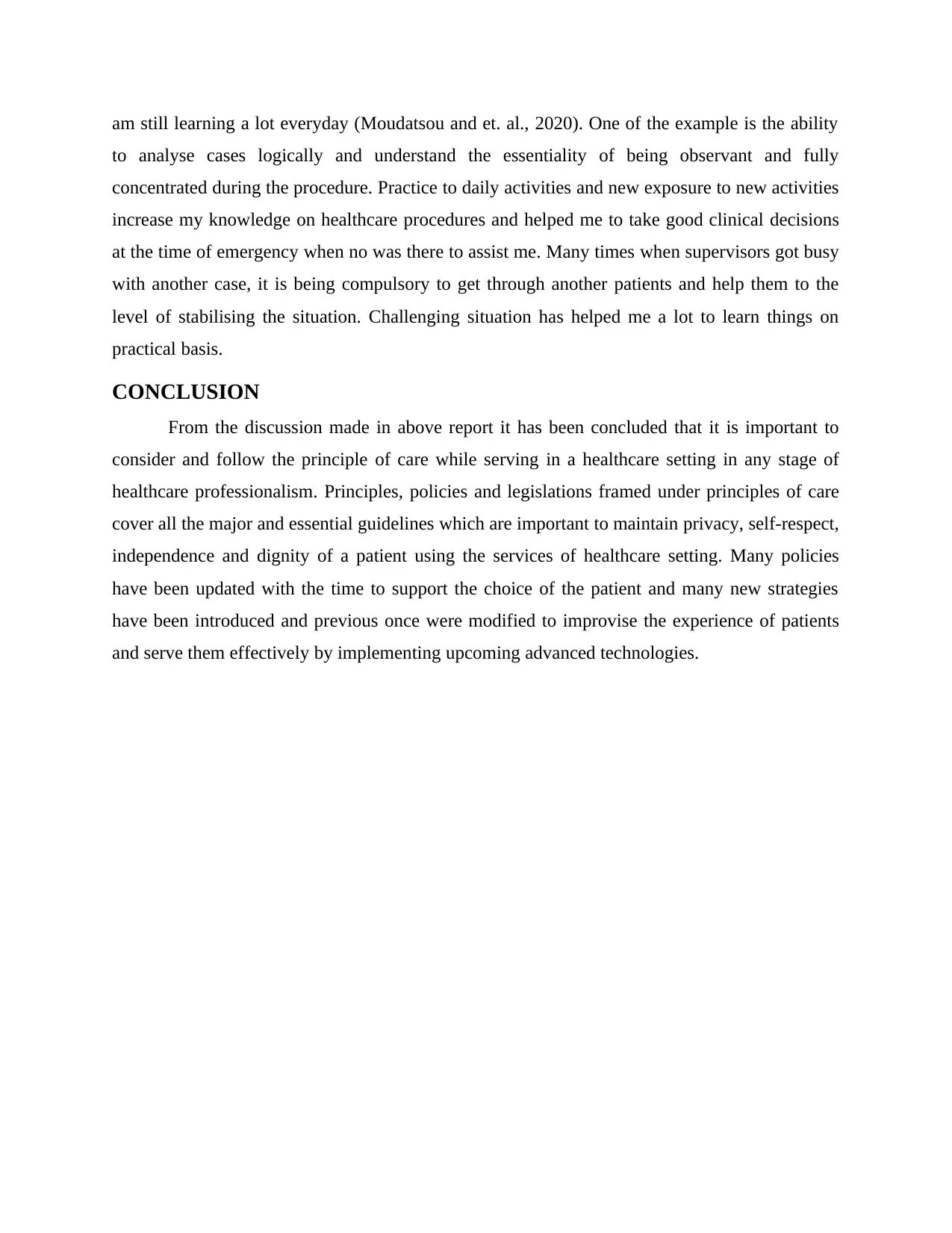
am still learning a lot everyday (Moudatsou and et. al., 2020). One of the example is the ability
to analyse cases logically and understand the essentiality of being observant and fully
concentrated during the procedure. Practice to daily activities and new exposure to new activities
increase my knowledge on healthcare procedures and helped me to take good clinical decisions
at the time of emergency when no was there to assist me. Many times when supervisors got busy
with another case, it is being compulsory to get through another patients and help them to the
level of stabilising the situation. Challenging situation has helped me a lot to learn things on
practical basis.
CONCLUSION
From the discussion made in above report it has been concluded that it is important to
consider and follow the principle of care while serving in a healthcare setting in any stage of
healthcare professionalism. Principles, policies and legislations framed under principles of care
cover all the major and essential guidelines which are important to maintain privacy, self-respect,
independence and dignity of a patient using the services of healthcare setting. Many policies
have been updated with the time to support the choice of the patient and many new strategies
have been introduced and previous once were modified to improvise the experience of patients
and serve them effectively by implementing upcoming advanced technologies.
to analyse cases logically and understand the essentiality of being observant and fully
concentrated during the procedure. Practice to daily activities and new exposure to new activities
increase my knowledge on healthcare procedures and helped me to take good clinical decisions
at the time of emergency when no was there to assist me. Many times when supervisors got busy
with another case, it is being compulsory to get through another patients and help them to the
level of stabilising the situation. Challenging situation has helped me a lot to learn things on
practical basis.
CONCLUSION
From the discussion made in above report it has been concluded that it is important to
consider and follow the principle of care while serving in a healthcare setting in any stage of
healthcare professionalism. Principles, policies and legislations framed under principles of care
cover all the major and essential guidelines which are important to maintain privacy, self-respect,
independence and dignity of a patient using the services of healthcare setting. Many policies
have been updated with the time to support the choice of the patient and many new strategies
have been introduced and previous once were modified to improvise the experience of patients
and serve them effectively by implementing upcoming advanced technologies.
⊘ This is a preview!⊘
Do you want full access?
Subscribe today to unlock all pages.

Trusted by 1+ million students worldwide
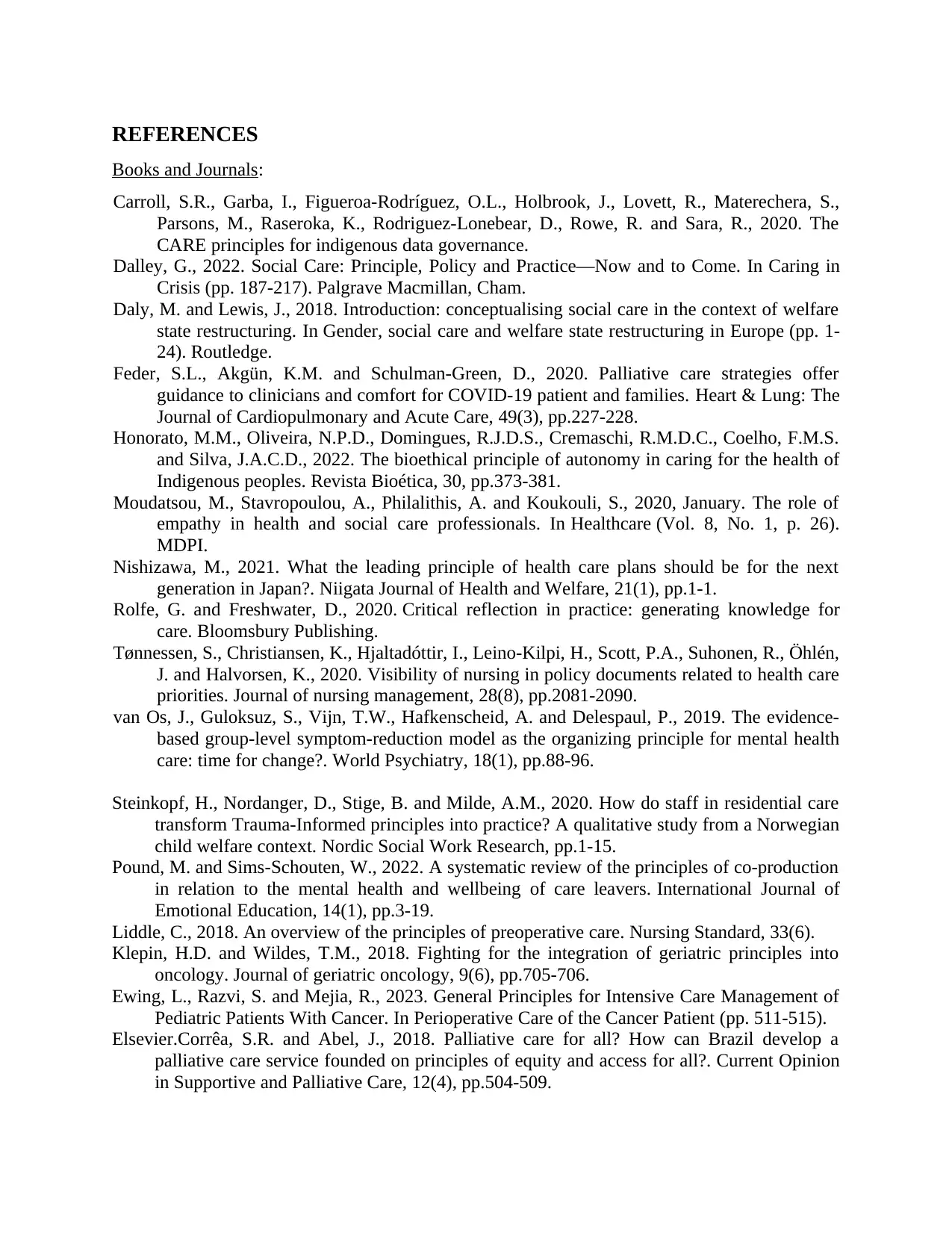
REFERENCES
Books and Journals:
Carroll, S.R., Garba, I., Figueroa-Rodríguez, O.L., Holbrook, J., Lovett, R., Materechera, S.,
Parsons, M., Raseroka, K., Rodriguez-Lonebear, D., Rowe, R. and Sara, R., 2020. The
CARE principles for indigenous data governance.
Dalley, G., 2022. Social Care: Principle, Policy and Practice—Now and to Come. In Caring in
Crisis (pp. 187-217). Palgrave Macmillan, Cham.
Daly, M. and Lewis, J., 2018. Introduction: conceptualising social care in the context of welfare
state restructuring. In Gender, social care and welfare state restructuring in Europe (pp. 1-
24). Routledge.
Feder, S.L., Akgün, K.M. and Schulman-Green, D., 2020. Palliative care strategies offer
guidance to clinicians and comfort for COVID-19 patient and families. Heart & Lung: The
Journal of Cardiopulmonary and Acute Care, 49(3), pp.227-228.
Honorato, M.M., Oliveira, N.P.D., Domingues, R.J.D.S., Cremaschi, R.M.D.C., Coelho, F.M.S.
and Silva, J.A.C.D., 2022. The bioethical principle of autonomy in caring for the health of
Indigenous peoples. Revista Bioética, 30, pp.373-381.
Moudatsou, M., Stavropoulou, A., Philalithis, A. and Koukouli, S., 2020, January. The role of
empathy in health and social care professionals. In Healthcare (Vol. 8, No. 1, p. 26).
MDPI.
Nishizawa, M., 2021. What the leading principle of health care plans should be for the next
generation in Japan?. Niigata Journal of Health and Welfare, 21(1), pp.1-1.
Rolfe, G. and Freshwater, D., 2020. Critical reflection in practice: generating knowledge for
care. Bloomsbury Publishing.
Tønnessen, S., Christiansen, K., Hjaltadóttir, I., Leino‐Kilpi, H., Scott, P.A., Suhonen, R., Öhlén,
J. and Halvorsen, K., 2020. Visibility of nursing in policy documents related to health care
priorities. Journal of nursing management, 28(8), pp.2081-2090.
van Os, J., Guloksuz, S., Vijn, T.W., Hafkenscheid, A. and Delespaul, P., 2019. The evidence‐
based group‐level symptom‐reduction model as the organizing principle for mental health
care: time for change?. World Psychiatry, 18(1), pp.88-96.
Steinkopf, H., Nordanger, D., Stige, B. and Milde, A.M., 2020. How do staff in residential care
transform Trauma-Informed principles into practice? A qualitative study from a Norwegian
child welfare context. Nordic Social Work Research, pp.1-15.
Pound, M. and Sims-Schouten, W., 2022. A systematic review of the principles of co-production
in relation to the mental health and wellbeing of care leavers. International Journal of
Emotional Education, 14(1), pp.3-19.
Liddle, C., 2018. An overview of the principles of preoperative care. Nursing Standard, 33(6).
Klepin, H.D. and Wildes, T.M., 2018. Fighting for the integration of geriatric principles into
oncology. Journal of geriatric oncology, 9(6), pp.705-706.
Ewing, L., Razvi, S. and Mejia, R., 2023. General Principles for Intensive Care Management of
Pediatric Patients With Cancer. In Perioperative Care of the Cancer Patient (pp. 511-515).
Elsevier.Corrêa, S.R. and Abel, J., 2018. Palliative care for all? How can Brazil develop a
palliative care service founded on principles of equity and access for all?. Current Opinion
in Supportive and Palliative Care, 12(4), pp.504-509.
Books and Journals:
Carroll, S.R., Garba, I., Figueroa-Rodríguez, O.L., Holbrook, J., Lovett, R., Materechera, S.,
Parsons, M., Raseroka, K., Rodriguez-Lonebear, D., Rowe, R. and Sara, R., 2020. The
CARE principles for indigenous data governance.
Dalley, G., 2022. Social Care: Principle, Policy and Practice—Now and to Come. In Caring in
Crisis (pp. 187-217). Palgrave Macmillan, Cham.
Daly, M. and Lewis, J., 2018. Introduction: conceptualising social care in the context of welfare
state restructuring. In Gender, social care and welfare state restructuring in Europe (pp. 1-
24). Routledge.
Feder, S.L., Akgün, K.M. and Schulman-Green, D., 2020. Palliative care strategies offer
guidance to clinicians and comfort for COVID-19 patient and families. Heart & Lung: The
Journal of Cardiopulmonary and Acute Care, 49(3), pp.227-228.
Honorato, M.M., Oliveira, N.P.D., Domingues, R.J.D.S., Cremaschi, R.M.D.C., Coelho, F.M.S.
and Silva, J.A.C.D., 2022. The bioethical principle of autonomy in caring for the health of
Indigenous peoples. Revista Bioética, 30, pp.373-381.
Moudatsou, M., Stavropoulou, A., Philalithis, A. and Koukouli, S., 2020, January. The role of
empathy in health and social care professionals. In Healthcare (Vol. 8, No. 1, p. 26).
MDPI.
Nishizawa, M., 2021. What the leading principle of health care plans should be for the next
generation in Japan?. Niigata Journal of Health and Welfare, 21(1), pp.1-1.
Rolfe, G. and Freshwater, D., 2020. Critical reflection in practice: generating knowledge for
care. Bloomsbury Publishing.
Tønnessen, S., Christiansen, K., Hjaltadóttir, I., Leino‐Kilpi, H., Scott, P.A., Suhonen, R., Öhlén,
J. and Halvorsen, K., 2020. Visibility of nursing in policy documents related to health care
priorities. Journal of nursing management, 28(8), pp.2081-2090.
van Os, J., Guloksuz, S., Vijn, T.W., Hafkenscheid, A. and Delespaul, P., 2019. The evidence‐
based group‐level symptom‐reduction model as the organizing principle for mental health
care: time for change?. World Psychiatry, 18(1), pp.88-96.
Steinkopf, H., Nordanger, D., Stige, B. and Milde, A.M., 2020. How do staff in residential care
transform Trauma-Informed principles into practice? A qualitative study from a Norwegian
child welfare context. Nordic Social Work Research, pp.1-15.
Pound, M. and Sims-Schouten, W., 2022. A systematic review of the principles of co-production
in relation to the mental health and wellbeing of care leavers. International Journal of
Emotional Education, 14(1), pp.3-19.
Liddle, C., 2018. An overview of the principles of preoperative care. Nursing Standard, 33(6).
Klepin, H.D. and Wildes, T.M., 2018. Fighting for the integration of geriatric principles into
oncology. Journal of geriatric oncology, 9(6), pp.705-706.
Ewing, L., Razvi, S. and Mejia, R., 2023. General Principles for Intensive Care Management of
Pediatric Patients With Cancer. In Perioperative Care of the Cancer Patient (pp. 511-515).
Elsevier.Corrêa, S.R. and Abel, J., 2018. Palliative care for all? How can Brazil develop a
palliative care service founded on principles of equity and access for all?. Current Opinion
in Supportive and Palliative Care, 12(4), pp.504-509.
Paraphrase This Document
Need a fresh take? Get an instant paraphrase of this document with our AI Paraphraser
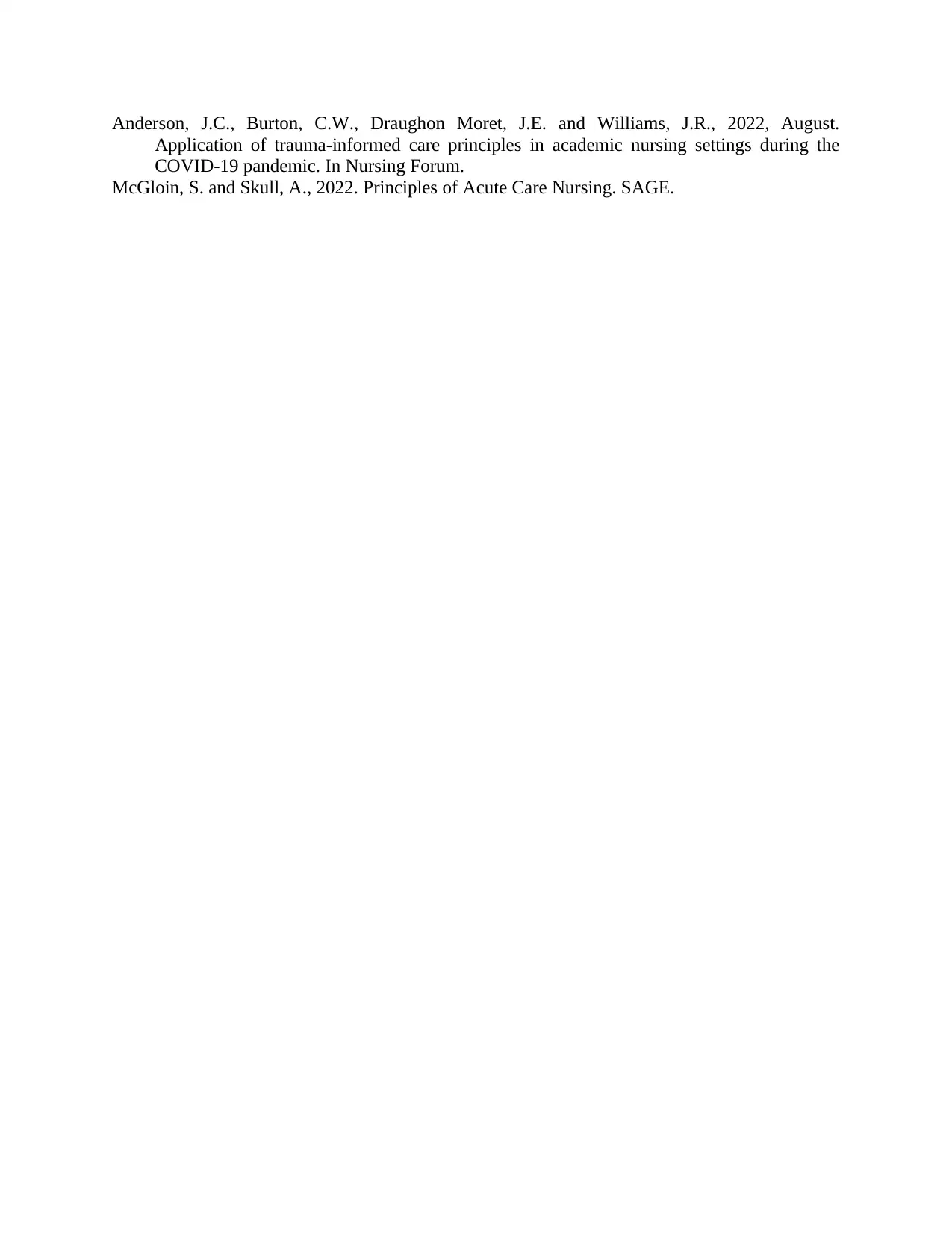
Anderson, J.C., Burton, C.W., Draughon Moret, J.E. and Williams, J.R., 2022, August.
Application of trauma‐informed care principles in academic nursing settings during the
COVID‐19 pandemic. In Nursing Forum.
McGloin, S. and Skull, A., 2022. Principles of Acute Care Nursing. SAGE.
Application of trauma‐informed care principles in academic nursing settings during the
COVID‐19 pandemic. In Nursing Forum.
McGloin, S. and Skull, A., 2022. Principles of Acute Care Nursing. SAGE.
1 out of 11
Related Documents
Your All-in-One AI-Powered Toolkit for Academic Success.
+13062052269
info@desklib.com
Available 24*7 on WhatsApp / Email
![[object Object]](/_next/static/media/star-bottom.7253800d.svg)
Unlock your academic potential
Copyright © 2020–2026 A2Z Services. All Rights Reserved. Developed and managed by ZUCOL.





